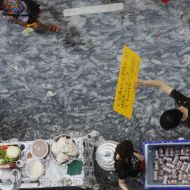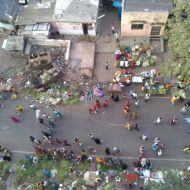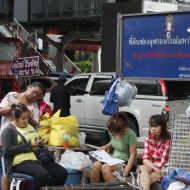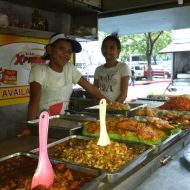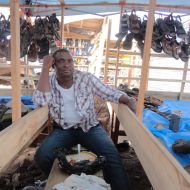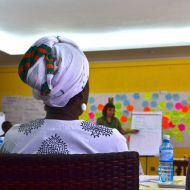“I Wish I Could Work on Those Dumpsites You See on TV”
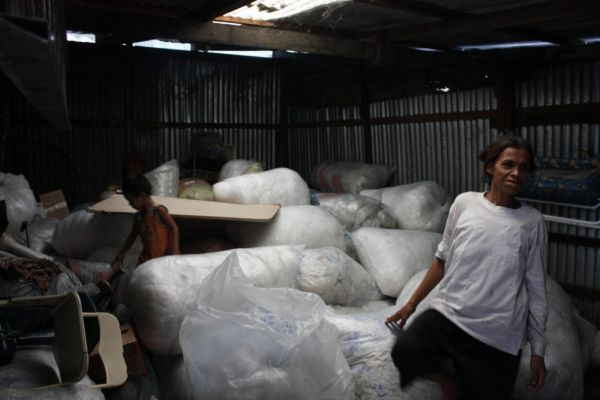
Somjai took me to the shack where the trash and plastic are stored. “Five kilos per bag,” she says. Photo credit: Witchaya Pruecksamars
About a week before Christmas, I joined a group of volunteers handing out candy and presents to kids living in Bangkok’s “Slaughterhouse” (Trok Rongmu), the sprawling slum of Klong Toey.
Under the high roof of the community sports field, shaded from the blazing afternoon sun, more than a hundred kids were queuing up for gifts and playing with Santa and his helpers. But the organized chaos got to be a bit too much for me, so I secluded myself and took some photos, including this panorama from high up on the surrounding fence:
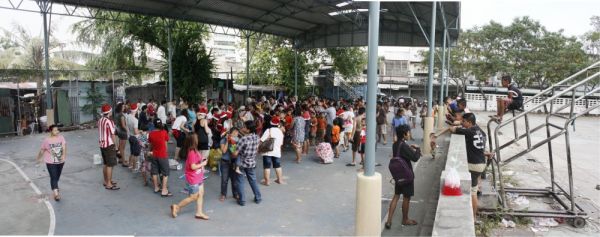
Photo credit: Witchaya Pruecksamars
From there, something strange caught my eye on the other side of the concrete field: an elderly woman half-submerged in a translucent sea of plastic sheeting.
As I approached, I saw that she was seated on a low stool. She was wearing a baggy white t-shirt, and her hair was held back in a chaotic bun by a pink plastic clip. She looked up at me, and I saw that her teeth and gums were bleeding from the betel leaves and areca nuts she was chewing — her only luxury I later realized. In her hands were a pair of scissors.
She was fussing with the sheets of plastic, cutting them into pieces.
Her name is Somjai Tuung-ngern (สมใจ ถุงเงิน). Somjai literally means “a bag of money.” “But I don’t have any money,” she chuckles, the whole time utterly absorbed in her task. She tells me that her husband’s name is Sam-ang (สำอาง), which means “glamorous” in Thai. “Sounds like a girl’s, right?” she smiles. The two of them, Glamorous and A Bag of Money, live here in Bangkok’s Slaughterhouse.
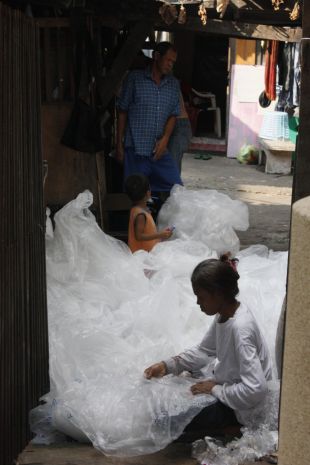
Somjai submerged in her work, with her husband and one of the two grandchildren in her care. Photo credit: Witchaya Pruecksamars
Somjai’s job is to “prep” plastic bags before they are sold to a recycling plant. Each Wednesday, her boss, the owner of a small junk shop, buys the bags in bulk from a garment factory. The factory receives its raw materials in the bags, which are just large tubes of thin plastic sheeting sealed at both ends with tape. Somjai’s boss delivers a load of the bags to her with his pickup truck every day. Her job is to pull out the tape and cut out any patches that are stained with pen markings. By the end of the day, the small courtyard where she works is inundated with plastic sheets.
For her ten-hour days prepping the bags, she earns 3 baht (10 cents) per kilo. If she churns out a kilo per hour every single day, that adds up to about 1,050 baht, or $35 USD, per month.
Her boss effectively acts as a middleman and Somjai and her husband as outsourced labor for him. I talked to another junk shop owner, like her boss, and made some simple calculations: the old couple gets 3 baht per kilo of work (plus free accommodation) while the junk shop owner can net 7 to 17 baht (minus the costs of transporting of the bags). His profit fluctuates depending on the market price, which is set by big recycling and separation plants, and the color of the plastic (the older it is, the darker it gets, lowering the price).
In a sense, Somjai and her husband are being grossly exploited (they don’t know these numbers). But next to being homeless, they’re just grateful to have a roof over their heads. Her boss is lucky to find someone in a dire situation like Somjai, and she is lucky to find someone kindhearted enough to provide her family with free shelter. It’s a mutually beneficial scenario, and she’s trying to make the best of it by working hard.
Somjai’s income is well below Thailand’s national poverty line of 1,678 baht per month ($56 USD). Even with her husband doing the same job as her – and on top of that, earning 400 baht for a weekly labor job — it’s still not enough to support themselves and their two grandchildren.
“The other workers ran away long ago because the wage is too low,” she says. Although their accommodation is provided by her boss she realizes that nothing is free in this world. “If I can’t work, then why would he keep me?”
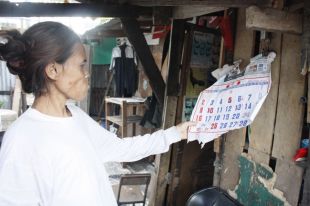
A neighbor came by to tell Somjai the day’s winning lottery numbers, but she was not in luck. She had bought the 20 baht ticket on loan. Photo credit: Witchaya Pruecksamars
There’s a phrase in Thai for the informal life: Ha chaaow kin kaam. It means, “Earn in the morning, eat in the evening,” and it illustrates the precarious day-to-day existence of those at the bottom of the economic food chain. In places like Klong Toey, where formal employment is scarce, the informal economy is key to people’s livelihoods, especially women and old people who stand little chance of finding jobs elsewhere. But it can also be a trap, as Somjai’s predicament illustrates. She has no job security, certainly no pension or workers’ benefits, and her housing is dependent on the whims of her boss. “It’s near New Year’s already,” she says. “The factory will be closed for a week or two, and there will no bags for us to work on.” When you don’t know how you’re going to make ends meet in the next few days, planning for retirement is a pipe dream.
“Sometimes I wish I could work at those dumpsites you see on TV,” she says. “There are mountains of trash that I can work on.” The fantasy seems to be vivid in her mind’s eye. “But it’s too far from where I live.”
At 57, she and her husband are not yet old enough to benefit from Thailand’s 500 Baht Universal Pension Scheme, which covers those over 60 years of age. In fact, their registration of residence, which would act as a certificate for claiming any pension or benefit, still lists their home as being in the province of Khorat (a nickname for Nakhon Ratchasima province; Thai names are often so long that we make up nicknames).
She has three daughters — two are married, but all are unemployed. With two of her grandsons under her care, her biggest expense is the boys’ tuition fees and pocket money. “If there’s one more, I’ll hang myself,” she says. She can’t rely on her daughters’ husbands either because one is a drug-addict, she says, and the other “buys everything on loans …from CD player… TV… mobile phone… everything!”
Thailand is known as the Land of Smiles, and indeed, there’s plenty to love about it. But for more than a decade, Somjai has been snipping her plastic bags and wondering why the city offers her so little. For fifteen years before this job, she spent her nights “cleaning pig intestines”, working on seventy pigs a night for 200 baht – around 8 dollars back then. Her role at the intersection of formal and informal isn’t one that can be romanticized.
“Sometimes I wonder why I was born at all,” she sighs. “I just don’t want the boys to grow up living a hard life like mine.”

